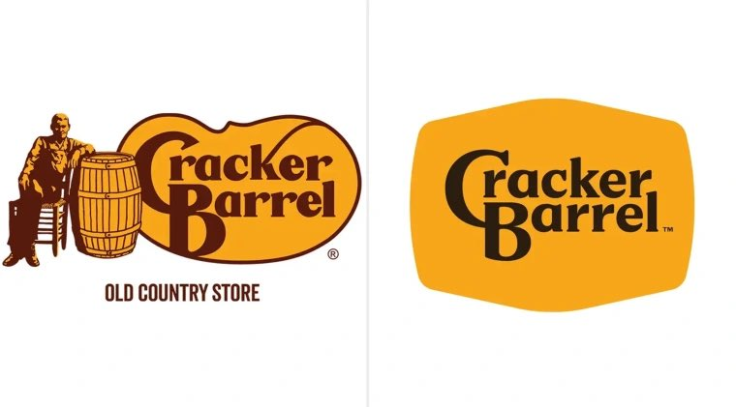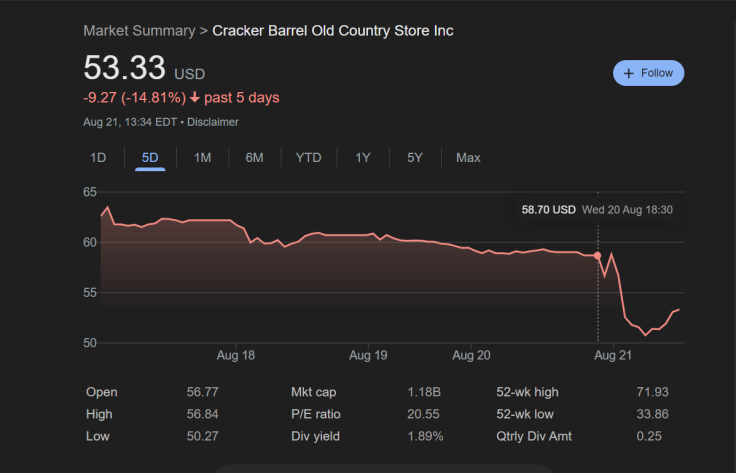Cracker Barrel Drops Consulting Firm 'Prophet' For Failed 'Woke' Rebrand: What Other Brands Has the Firm Worked With?
Cracker Barrel ends its partnership with consulting firm Prophet after a $140M backlash to its logo redesign — raising questions about rebranding legacy icons.

Cracker Barrel has officially severed its contract with Prophet, the consultancy behind a rebranding that removed its iconic 'Uncle Herschel' logo and triggered backlash.
Within weeks, the company reversed course, reinstated its heritage logo, and reorganised its leadership. The reversal followed an estimated $140 million drop in market value, heavy public criticism, and political intervention. This debacle raises urgent questions: what other brands has Prophet worked with — and when does transformation cross the line into brand erasure?
The Logo Uproar and Reversal
In August 2025, Cracker Barrel unveiled a simplified logo, eliminating its traditional figure of a man leaning on a barrel—an image many customers had associated with the brand's identity.
The redesign featured a simpler logo that omitted the iconic figure and featured a more minimalist aesthetic across select restaurant stores.
Within days, conservative figures and longtime patrons accused the chain of abandoning its heritage. The criticism escalated publicly.
As backlash mounted, Cracker Barrel announced it would restore its old 'Old Timer' logo and suspend further remodels. It also eliminated the role of Chief Restaurant & Retail Operations Officer and shifted oversight to existing executives.
The uproar escalated to involve political commentary — President Donald Trump publicly urged Cracker Barrel to revert to its original look.

Who Is Prophet?
Prophet is a global strategy and creative consultancy with roughly 15 offices worldwide and 500–1000 employees. It describes itself as the 'Uncommon Growth Company,' specialising in brand strategy, experience design, marketing, transformation and organisational culture.
The Prophet's public client roster, past and present, includes T-Mobile (assisting in its 'Un-carrier' repositioning), Marriott, Netflix, Electrolux, UBS, Amazon, CVS Health, Home Depot, and Keurig, among others. Some of these engagements span full rebrands, organisational alignment, or experience innovation.
Prophet is a growth, branding, and transformation consultancy headquartered in San Francisco. The firm calls itself 'the Uncommon Growth Company,' assisting clients with brand strategy, marketing, organisational culture, and experience design. According to company press materials, it operates across multiple global offices (around 15) and employs several hundred strategists, creatives, and analysts.
Other Rebrand Wins and Failures
In some cases, Prophet has been credited with successful repositioning. Its role in helping T-Mobile challenge industry norms is frequently cited. For legacy brands, though, bold repositioning can backfire. Cracker Barrel's experience is a stark example: when core fans see change as erasure, the backlash can be swift and severe.
Lessons for Heritage Brands
- Know your core audience. Cracker Barrel misjudged the depth of its traditional imagery's resonance with loyal customers.
- Test gradually. Radical change across stores and the logo overnight amplifies risk.
- Balance modernisation with memory. Transformation should feel evolutionary, not revolutionary.
- Watch symbolic assets. Logos, mascots and visual cues often carry emotional meaning beyond design.
Looking Ahead
Cracker Barrel's retreat does not erase the ambition to modernise; analysts expect continued investment in store upkeep, menu innovation, and digital outreach, albeit with deeper fidelity to the brand's legacy. Prophet, meanwhile, must reckon with whether its 'uncommon growth' framework can survive a very public failure on a high-stakes rebrand.
The fallout illustrates the risks associated with tampering with symbols that customers perceive as integral to their identity.
© Copyright IBTimes 2025. All rights reserved.





















